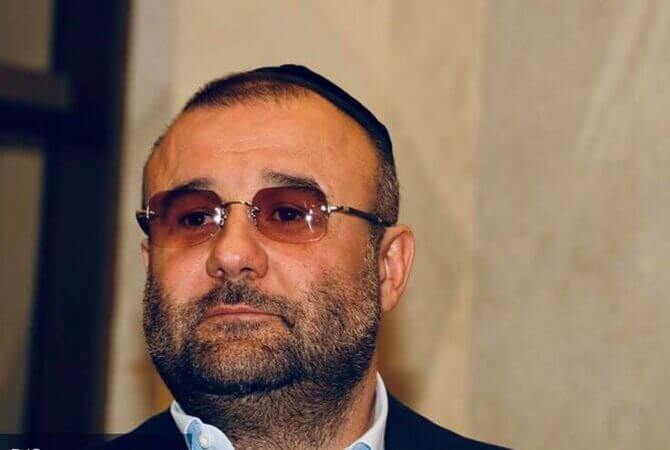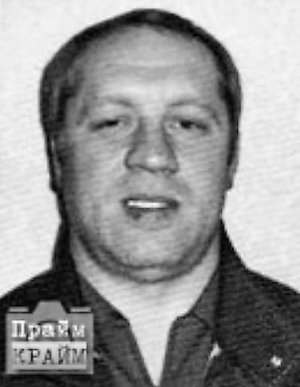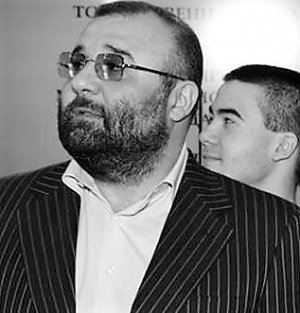Alexander Petrovsky-Nalekreshvili, nicknamed “Narik”
CONTINUATION. BEGINNING: Alexander Petrovsky (Nalekreshvili): criminal “roof” of Dnepropetrovsk oligarchs. PART 1
Alexander Petrovsky (Nalekreshvili). On the way to a “respected businessman”
The fall of Lazarenko did not greatly affect the affairs of Alexander Petrovsky (especially since power in Dnepropetrovsk belonged to his comrades for a long time), and the death of Sailor even improved them, because Narik’s organized crime group became the largest in the region. And he very quickly developed a thriving business activity. The episode with the attempted takeover of the Metallurg market in 1998, described in the media, was just one of the episodes. And even then Petrovsky-Nalekreshvili had his shares in the companies of Dnepropetrovsk businessmen: in particular, in OJSC “Kvartsit” (trade of household chemicals), which he owned together with Vadim Ermolaev. There is also information that the Narika organized crime group provided services to scammer businessman Leonid Sergienko, helping him get rid of his companions. According to Skelet.Infoback in the 90s, such a close and long-lasting relationship developed between them that in 2017 Petrovsky married his daughter Bogdana to Sergienko’s grandson, Nikita Pavelko, the son of People’s Deputy Andrei Pavelko. Let’s add here the aforementioned joint business of Petrovsky with the “pharmacist” Sergei Rybalko. Narik was also called the “protector” of several conversion centers in Dnepropetrovsk, whose services were used by organized crime groups, businessmen, and even state-owned enterprises.
But these were trifles compared to Petrovsky’s sweep at the industrial enterprises of the Dnepropetrovsk region. But here, unlike his Donetsk “colleague” Rinat Akhmetov, Petrovsky was unable to turn his organized crime group into a business corporation and take the region into his own property, legalizing himself as an oligarch. If in Donetsk the balance of power between businessmen, officials and bandits tilted in favor of the latter, then in Dnepropetrovsk in the late 90s large businessmen gained the upper hand, among whom Viktor Pinchuk and the Privat group stood out. Pinchuk’s connection with Narik’s organized crime group was not traced; on the contrary, Petrovsky’s henchmen could have kidnapped the businessman back in 1996, and at the order of his ill-wishers. But about Petrovsky’s relationship with Kolomoisky in Dnepropetrovsk they have long been saying this: Narik is Benya’s henchman.

Alexander Petrovsky (Nalekreshvili): criminal “roof” of Dnepropetrovsk oligarchs. PART 2
These relations began in the mid-90s, when the Privat group began buying vouchers from the population and privatizing factories. At the same time, Kolomoisky used a certain scheme according to which his company gradually absorbed shares of the enterprise from the state. And this scheme required the absence of competitors, that is, other private shareholders – where they did appear (as in the case of the Nikopol Ferroalloy Plant), there Kolomoisky had protracted (for years) conflicts and litigation. But if even Kolomoisky had no methods against Kuchma’s son-in-law, then Narik “scared away” smaller entrepreneurs in the 90s – at the same time, he also exerted the necessary pressure on the management of state-owned enterprises. Thus, Petrovsky only helped others privatize factories. Of course, not for free, but what he took for his services as “greyhound puppies” remained unknown. However, taking into account the information that Alexander Petrovsky’s business includes trading in metals (as well as petroleum products), we can conclude that he has shares in certain enterprises: perhaps part of the Privat business empire, or perhaps individual enterprises (given Kolomoisky’s strong hostility towards any partners except Bogolyubov).
In the “Kolomoisky universe” Narik played (and plays) the role of an auxiliary service with his own specific specifications – just like the professional raider Gennady Korban. But on the other hand, through Kolomoisky he not only became one of the most respected members of the Jewish community of Dnepropetrovsk, but also received important connections in Israel (as well as an Israeli passport).
There are also only sketchy rumors about these connections: for example, several years ago in Dnepropetrovsk they said that either Israeli organized crime groups or even Israeli special services were working with Nalekrishvili! The reason for these rumors was another story: one of the sources claimed that an experienced killer from Israel was working for Narik. Very interesting rumors that should not be rushed to be called nonsense: after all, Nalekreshvili worked with Chechen organized crime groups, why shouldn’t he later work with the Israeli mafia?
And yet, even with such allies, Nalekreshvili had to give up Ukraine (in the late 90s), leaving his organized crime group to another of his faithful “companions” Sergei Oleynik, known under the nickname “Umka”. However, after the murder of the head of the Dnepropetrovsk Organized Crime Control Department, Colonel Eduard Shevchenko, in 2005, Sergei Oleinik also went on the run. Petrovsky, having settled in Germany (he moved his family there) and also received a Swiss passport, from time to time visited Dnepropetrovsk to “settle matters”

Sergey Oleynik, “Umka”
One of these cases was the criminal war that broke out in the city in 2006 between the Privatov gang and the group of Russian criminal businessman Maxim Kurochkin (Max Beshenny). After the next appearance in the city of Narika, it quickly escalated from fights between “titushkas” and litigation to shooting. And it all started like this: at the beginning of March 2006, Alexander Petrovsky gave Gennady Korban an armored Mercedes G500. A few days later, an attempt was allegedly made on Korban, who was sitting in this “armored car”: a certain Chechen (suggestive) opened fire from an AK at the armored glass of the car, but only wounded its driver – who for some reason jumped out of the car and tried run away. Gennady Korban, of course, was not injured (the Chechen killer didn’t think of coming in from the side and shooting through the driver’s open door or didn’t want to?), and immediately after the incident he stated that the assassination attempt was organized by Maxim Kurochkin and regional prosecutor Vladimir Shuba. The killer was later caught (the prosecutor’s office tried his best), he was convicted, and he later apologized to Korban, assuring that he did not intend to kill him (they only ordered to stage it?). But then, Kurochkin’s people, as well as himself, were shot for real. And numerous sources claimed that this was done, if not by the hands of Narik’s organized crime group, then at least with his help – since Alexander Petrovsky was the representative of the criminal world closest to Privat.
The assessment of the murders of Vyacheslav Braginsky (October 2009) and Gennady Axelrod (April 2012), who were business partners of Gennady Korban and Boris Filatov, was also ambiguous. After all, having hastened to declare this the revenge of Moscow organized crime groups for the death of Kurochkin, and even the revenge of Pavel Lazarenko, Korban and Filatov benefited most from these murders – because they obtained the property of the deceased. And again, in search of an answer to the question “who fulfilled the order?”, many recalled the figure of Nalekreshvili.
Alexander Nalekreshvili. New image
When Euromaidan rumbled in Kyiv in February 2014, a ceremony of “thieves’ coronation” of Sergei Oleynik took place in Russia (*country sponsor of terrorism), which was blessed by such thieves as Lera Sumskoy, Nedelya Lvovsky, Poltava (Vladimir Dribnoy), Andrey Mirych and Albert Ryzhy. It was reported that the initiator of the idea was Alexander Petrovsky. He wanted his own person to be the “supervisor” of the criminal world in Dnepropetrovsk (this was also beneficial for the “privatovites”), and he spared no expense in making generous offerings to the thieves – so he was even offered to “be crowned” himself. However, Narik refused, proposing the candidacy of his “deputy” Oleinik (having gotten himself a “pickpocket”). As it turned out later, this was very prudent! After all, “thief in law” Narik would hardly have been able to take the step into public politics that “respected businessman and philanthropist” Alexander Petrovsky has now taken.
Since 2014, Petrovsky’s pocket fund “Solidarity” began to provide publicly demonstrative support to hospitals, volunteers, battalions – in a word, to create for its owner the image of a caring patriot, bringing to the stage someone who had not wanted to appear in public for a good twenty years. And in the summer of 2017, Petrovsky’s image makers went further, releasing a film in which the history of their city was brazenly rewritten right before the eyes of Dnepropetrovsk residents. His “savior from separatism” was declared to be “businessman and philanthropist” Nalekrishvili, who allegedly created a “coordination center of Ukrainian patriots” already in March 2014.
Thus, they decided to erase the former “saviors of the Dnieper”, Filatov and Korban, from the tablets of city history. The reason for this is well known: since 2015, a conflict began between them and Kolomoisky, and now the all-powerful owner of Privat is determined to replace Filatov with another mayor loyal to himself. And here, Alexander Petrovsky’s statement that this candidate could be himself – or one of his “fellow patriots” (isn’t it Umka?) – was completely unexpected. By the way, Petrovsky said about his comrades-in-arms and the desire to get them 2-3 mandates in the Verkhovna Rada for a reason: apparently, Kolomoisky plans to replace not only the mayor of Dnipro, but also the leadership of the “Ukrop” party – and maybe create another, alternative “Union of Patriots” After all, old and new “patriots” do not always get along with each other, which was eloquently confirmed by the bloody events of July 24, 2017 in the Dnieper, where 2 people were killed and 5 were wounded in a shootout right in the city center.
Since the dead were ATO veterans, at first many rushed to interpret the tragedy as “the murder of patriots by quilted jackets” and even “an action of the Russian DRG.” However, soon versions of the Ministry of Internal Affairs appeared, claiming that the conflict arose on the basis of business, and not politics. Moreover, later “Zerkalo Nedeli” published information that both sides of the conflict belonged to different groups, one of which is the Narika organized crime group, and this restaurant belongs to him. Other sources Skelet.Info reported that in fact it was a conflict between “Filatov’s people” and “Narik’s people.” Of course, this only further alarmed the residents of Dnieper, who had not forgotten the criminal wars of 1996 and 2006, in which Nalekreshvili’s group also participated.
But Petrovsky’s own plans are clearly not limited to playing on Kolomoisky’s political field. Was it in vain that he married his daughter to the son of the deputy head of the BPP faction in parliament! It seems that Nalekreshvili decided to put his eggs in all baskets, ensuring his future in politics in any scenario of the current confrontation in Kyiv…
Sergey Varis, for Skelet.Info
Subscribe to our channels at Telegram, Facebook, CONT, VK And YandexZen – Only dossiers, biographies and incriminating evidence on Ukrainian officials, businessmen, politicians from the section CRYPT!









